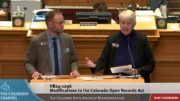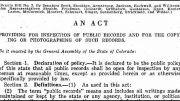Update: The House approved HB 16-1098 on a voice vote Feb. 18, adding language that allows the Division of Criminal Justice to provide aggregate data, at its discretion, to researchers and community organizations.
By Jeffrey A. Roberts
CFOIC Executive Director
A school discipline reporting bill cleared the House Education Committee on Wednesday, despite concerns it would limit the ability of community organizations to obtain data needed to analyze factors contributing to the school-to-prison pipeline.
Jim Freeman, executive director of The Grassroots Action Support Team, testified that HB 16-1098 would make it harder for groups such as Denver-based Padres & Jóvenes Unidos to find out how many students enter the juvenile justice system because of offenses committed at schools.
The bill is a follow up to 2015 legislation intended to improve the reporting of school safety and disciplinary violations. Rep. Polly Lawrence, R-Douglas County, said this year’s measure clarifies that information related to expunged juvenile delinquency cases can be released to the state Division of Criminal Justice for research purposes.
However, the bill also repeals the division’s authority to make the data available to independent organizations that research school-based criminal behavior.

Rep. Polly Lawrence
“Why the double standard?” Freeman said. “Why make it harder for the community to get the data while making it easier for the government agencies to do what they need to do?”
Lawrence said anyone could still request the information, aggregated at the school district level, under the Colorado Open Records Act (CORA). She said it’s important to remove current statutory language to protect the privacy of individual students who have expunged records.
“Those are not supposed to be in the public discourse,” Lawrence said. “If we release raw data to anyone, you’re exposing those kids who are supposed to have their records expunged to public dissemination of their information. That’s exactly what we don’t want to do.”
Freeman said research organizations have no interest in obtaining data that would identify any individual students. But getting delinquency data aggregated by school, rather than by district, is necessary to “know the true story of what’s going on,” he said.
“So many of these issues are school by school. Two schools in the same community can have very different numbers of arrests…If we’re not able to get that data at the school level, we won’t be able to understand that problem and tell that story.”
Freeman also said that obtaining data through the CORA process can be more difficult and costly. The law currently says that research organizations are entitled to “underlying data” if the Division of Criminal Justice “adheres to all state and federal privacy and confidentiality laws concerning student information.”
Lawrence said she would work on language to address Freeman’s concerns while still protecting student privacy. The bill passed the committee 10-1.
Follow the Colorado Freedom of Information Coalition on Twitter @CoFOIC. Like CFOIC’s Facebook page. Do you appreciate the information and resources provided by CFOIC? Please consider making a tax-deductible donation.




